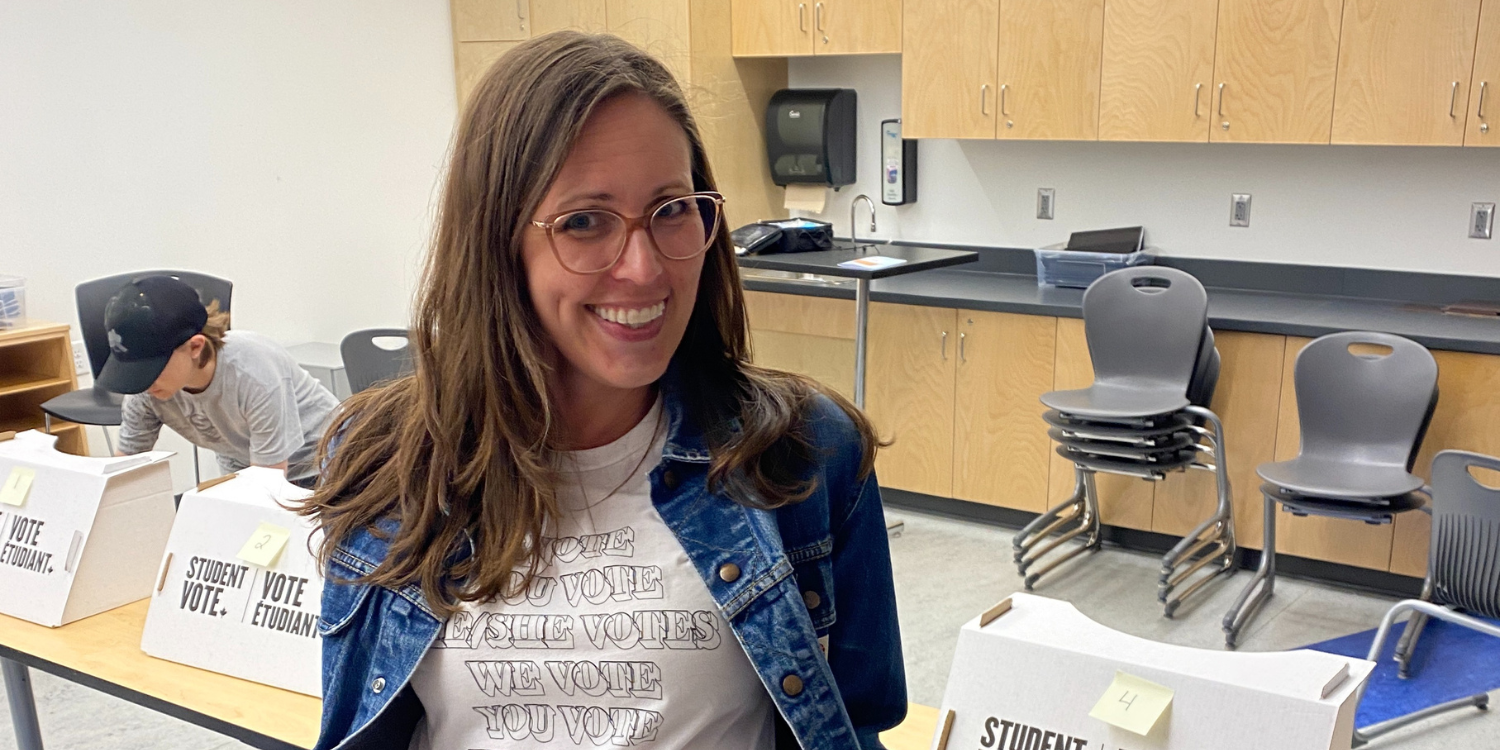Melissa Hopkins always knew she wanted to be a teacher. “I was that odd little four-year-old who would line up her dolls with the chalkboard,” she says. “I even made class lists.”
The path has been clear since, save for a brief flirtation in high school with the idea of using her research and debate skills to study law. “I thought that might change me as a person in a bad way,” she says, “so I chose something where I can help society in a good way.”
Raised in a working-class part of Northeast Calgary, Hopkins spent 19 years teaching there before transferring last year to the brand new Lakeshore School in the Southeast. It’s a change, but wherever you go “teenagers are teenagers,” Hopkins says.
A teacher of grade 9 Social Studies, English Language Arts, and Humanities, Hopkins believes teens in general are underestimated. “They get stereotyped as ‘you don’t know yet,’ but I find that they know more than some of the adults in their lives. And we need to give them a voice.”
Hopkins creates opportunities for students to learn to think critically and use their voice through a range of activities, often taking a cross-curricular approach.
“Last school year, we did an activity with science about the single use plastic ban,” she explains. “We talked about what are those impacts? How does this affect our citizenship, our identity, our quality of life? And, what does that mean from the different stakeholders perspectives?”
She has also worked with math to explore collective rights in the context of water quality on reservations. And being in Calgary, her class also looks at pipeline issues whenever they are in the news, a heated topic in a place so economically tied to the oil and gas industry.
“I never shy away from controversial subjects,” says Hopkins. “I feel like it’s a huge disservice to avoid them. Kids need to learn to have thoughtful and respectful conversations, realize you don’t have to agree with everything, and that maybe not every voice needs to be heard. School offers a safe space to learn these skills.”
Hopkins believes that it’s important to bring political processes to life to help students feel they have a stake and a shared social responsibility. “When we talk about the Charter, you have rights and freedoms, but you also have responsibilities,” she says. “So it’s important to get at that idea of what does ‘community’ mean, what is my role within the community?”
Hopkins’ approach is hands-on and experiential and one of her favourite activities is bringing elected representatives to class. She hosts Members of Parliament, through CIVIX’s Rep Day, and uses the SENgage program to host Senators. In 2018, then-Governor-General Julie Payette even Zoomed into her class.
Kids need to learn to have thoughtful and respectful conversations, realize you don't have to agree with everything, and that maybe not every voice needs to be heard. School offers a safe space to learn these skills.
“It’s really helpful for students to know that these politicians are actually just real people,” says Hopkins. “If you can make things real and tangible, it’s easier to understand that they’re not always going to do the job you want them to do, they’re doing the best with what they have, like anyone else.”
Among other activities, her students have joined letter-writing campaigns and travelled to Ottawa to see Parliament in action.
It was 2006 when Hopkins first started working with CIVIX, for the federal Student Vote. Today she supports her colleagues, planning and providing resources, and the whole school participates.
She collaborates with a grade 6 teacher to coordinate a team of volunteers in grades 6 and 9. “It’s really cool to see the littles and the bigs working together,” she says. Last election, Hopkins got a chance to add an extra layer to the learning after it was determined a second polling station was required to accommodate all of Lakeshore’s 950 students.
“It was exciting for me, because I’m like, ‘Ooh, now we can get into making a map for the school. We can make that connection to different polling stations in one riding,’” she says. “The kids made little cards for everyone, so the classes knew which voting station they had to go to. They checked their ID against a class list to make it as authentic as possible.”
Hopkins has seen Student Vote make a difference, and cites an example of a grade 6 student who, after voting, expressed confusion about why more people don’t do it, saying: “‘I’m going to vote forever because it was so easy.’ Yes, that’s a win. We want that attitude.”
“I feel like I am assembling a small army of informed citizens who are going to go out and vote,” she says. “That youth vote stat is going to increase because we’re doing this.”
At a Glance
Name: Melissa Hopkins
Location: Calgary, Alberta
Grades Taught: 9
Subjects Taught: Social Studies, English Language Arts, Humanities
Years Teaching: 20
Years Involved with CIVIX: 17
CIVIX programs used: Student Vote, Student Budget Consultation, PoliTalks, CTRL-F
Key Motivation: “I want to instill in students an awareness that they are part of a collective group. Yes, you're an individual, but you also belong to a collective. Being actively engaged in your country is important, and comes with rights and responsibilities.”
